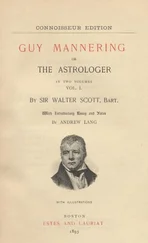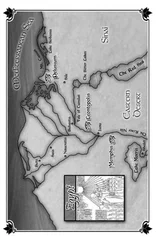They inched forward, into the fringes of the crowd, and Warreven leaned back in the seat, making himself as unobtrusive as possible. Most of the attention was directed toward the people—two women and a man—on the platform, but there was no point in attracting trouble. And trouble was already present: to the left of the car, on the edge of the concrete mole that marked the end of the buyers’ lot, a man in a traditional vest and docker’s trousers banged an ironwood wrench against a wooden pot. His hand rose and fell in an insistent counter beat, but any sound was drowned in the noise from the platform. He knew it as well as anyone, turned his fierce scowl on the people around him, exhorting them to join in disrupting the singers’ chant. He had painted red-and-white flames, the mark of the Captain, the spirit that Tendlathe was trying to make the Traditionalists’ patron, across each cheek. Most of them ignored him, or stood open-mouthed and undecided, looking at him and then back to the singers. Then at last a stocky man jumped up on the wall beside him, clapping his hands and calling to the others. The coupelet slid past before Warreven could see what happened.
They were almost abreast the platform now, and a woman’s clear voice—the voice of a sea chanter, someone trained to make herself heard over a full gale and the chaos of a sinking ship—soared over the insistent drums.
“ Shineo was the Captain’s daughter ,” she began, and most of the people answered automatically, conditioned by years of sailing.
“ Way-hey, Shineo .”
“ I love her a little bit more than I oughter ,” the chanter sang, and the response faltered, some voices dropping out, others coming in full and triumphant.
“ Way-hey, Shineo !”
“ Oh, Captain, Captain, I love your daughter .” The chanter’s voice was full of mocking challenge, not just of the Traditionalist with his painted face, but of everything he and the Captain stood for. The same note was in the crowd’s answer—as if, Warreven thought, they were all twelve again, and just learning there were real words, strong words, names for all the things they weren’t supposed to do, or be.
“ I’ll carry her across the deep blue water— ”
The driver gunned the engine, and the coupelet lurched for-ward into a gap in the traffic, but the sudden rumble couldn’t drown either the crowd’s gleeful response or the driver’s curse.
“ Garce bitch.”
Warreven lifted his head, and the driver met his eyes in the mirror, the half of his expression that Warreven could see caught between embarrassment and mulish conviction. Everyone knew Warreven was a halving , wry-abed, and a Modernist to boot, but this, the face seemed to say, was too much. Warreven lifted an eyebrow, and the driver’s stare faltered.
“Sorry, mir,” he muttered.
Warreven nodded, and looked away. A couple of Temelathe’s militia—the mosstaas , mustaches, technically members of the city patrol association, were standing on the edge of the crowd, heads turned toward the chanter. One rested his hand on his ironwood truncheon, but they stood otherwise passive, without noticeable expression, watching the crowd and the singer. There would be trouble later, Warreven thought, and wondered if Chauntclere was safe at sea.
Traffic eased as they swung away from the harbor, moving into one of the new mixed-use districts, where old warehouses and crumbling factories had been reclaimed for the workers in the newer plants south of the Goods Yard. Few people were visible in the streets, but here and there the wide doors were open to the evening, and Warreven caught a quick glimpse of a group of women, traditionally skirted, breasts pushed up and out by the tight traditional bodices, gathered around an open stove. A few children, most in ragged hand-me-downs, played on the cracked paving, under what had been a loading dock. They stopped their game to stare at the coupelet, and as it passed, the tallest threw a stone. It fell short, but Warreven saw the driver’s eyes in the mirror, watching them, and heard him mutter something indecent under his breath before he looked away.
The sun was well down by the time the coupelet drew up in front of the compound that surrounded Temelathe’s house, the cool twilight thickening toward dark. Lamps were lit on either side of the gate, and the taller of the mosstaas on duty there waved them through without hesitation. The driver maneuvered the coupelet between the pillars and slid it neatly to a stop outside the main entrance. The house itself was bigger than the clan house over by the Terminus, was easily as large as the White Watch House, and was rumored to have cost several years’ of Template’s disposable income. Even if that weren’t true, Warreven thought—and knowing Temelathe, he doubted it—it was still an impressive sight, a mute statement of all the ways that Stane out-stripped its neighbors. Lights blazed through the open doors and windows, and a woman in full traditional regalia, tiered and beaded skirts and tight bodice, crown of shells and flowers on her braided hair, came hurrying to open the door.
“Makado will show you where to put the car,” the woman said, to the driver. She had the high, breathless voice of the old-fashioned high-housekeepers, but only off-worlders failed to recognize its authority within its own sphere. A dark man in off-world clothes loomed silently out of the shadows, beckoning, and Warreven let the coupelet’s door fall shut behind him. The heavy vehicle slid away toward the sheds at the far side of the compound.
“Mir Stane is waiting,” the housekeeper said.
And standing on his dignity, too , Warreven thought. Or maybe it was just her habit to refer to Temelathe by the most exalted form of his name. He nodded, and gestured for her to precede him into the house.
The party hadn’t started yet, but a few of the guests were already present, gathered in one of the anterooms outside the main hall. The housekeeper swept him quickly past the doorway, but Warreven saw Aldess Donavie standing in the center of a circle of admirers. She saw him, too, and smiled graciously, showing perfect teeth, but did not beckon him in. There was no sign of Tendlathe—which was probably just as well, Warreven admitted. After their last argument, he’d rather keep out of Tendlathe’s way for a while.
The housekeeper stopped outside a familiar door and tapped lightly on the frame. “Enter,” a voice said, only slightly deadened by the dense wood, and the housekeeper pushed open the door.
“Mir Warreven, Mir Stane.”
Temelathe was sitting in his favorite chair, beside the massive cast-ceramic stove. It was unlit, of course, wouldn’t be lit until the coldest nights of the winter, but it was more expensive evidence of the clan’s power. “I’m so glad you could come,” he said, and Warreven heard the housekeeper shut the door behind him. “Sit down, make yourself comfortable. Liquertie ?”
Warreven glanced at the tray that rested on the cold stovetop. The flask was filled with indigo liquid, and a dark, twisted shape floated in its depths: not just ordinary liquertie , then, but black nectar, liquertie infused with the root pod from a vinegar tree. “Thank you. May I pour you a glass, my father?”
Temelathe nodded, a slight, slightly indulgent smile on his weathered face. He had never been handsome, had broadened with age until he looked like one of the aged wood carvings of the Captain. He cultivated that resemblance, of course, but it was still compelling, the fierce brown eyes enmeshed in the web of fine lines that covered his face. Warreven filled the delicate glasses with liquor that flowed like thick ink and handed one across with a slight, polite bow, falling into a familiar role. The dutiful son was useful, and generally safe: it gave no opportunity for criticism and rarely required one to commit oneself to anything.
Читать дальше












